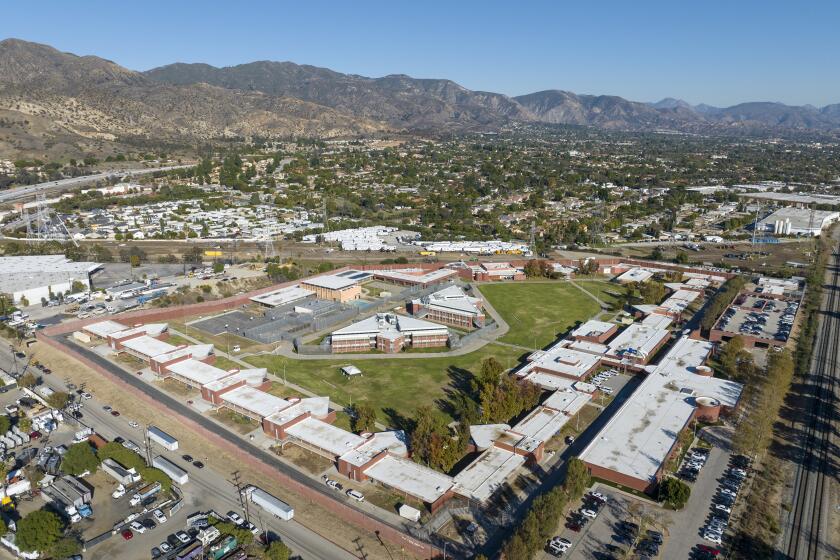Dancing Gays Sue Disneyland Anew in Suit Similar to One the Park Lost
- Share via
Claiming Disneyland denied them the right to be themselves, three gay men filed suit Thursday, alleging that the world-famous park illegally barred them from dancing with each other.
Disneyland, through a spokesman, declined comment on the lawsuit, which is virtually identical to one the park lost four years ago.
For the record:
12:00 a.m. March 16, 1988 For the Record
Los Angeles Times Wednesday March 16, 1988 Orange County Edition Metro Part 2 Page 2 Column 5 Metro Desk 1 inches; 26 words Type of Material: Correction
A Feb. 26 story misidentified a Palm Springs man who won a lawsuit against Disneyland after a security guard there told him he could not dance with another man in 1981. He is Andrew Exler.
Actually, the three UCLA students claimed they danced to fast numbers for an hour without incident last year. But when a slow tune was played, a battalion of Magic Kingdom guards quietly intervened, they allege.
‘Touch Dancing’ Barred
“Touch dancing is reserved for heterosexual couples only,” a guard said, according to the lawsuit filed in Orange County Superior Court.
The three are Christopher Drake, 23, of Westwood; Eric Hubert, 20, of Los Angeles, and Jeffrey Stabile Jr., 20, of Van Nuys. The suit was filed by a national gay rights legal fund and lawyer Leroy S. Walker.
“This is a tremendously important case to us,” said Abby R. Rubenfeld, director of the New York-based Lambda Legal Defense and Education Fund Inc.
“It’s about really important facts of life. It’s about being yourself in a public place.”
In the earlier lawsuit, two gay men persuaded a judge and an Orange County jury that Disneyland had violated the Unruh Act, California’s basic civil rights law, when guards stopped them from dancing together in 1981.
The difference between that incident and this, according to the law professor who represented the plaintiffs in the first case, seems to be the speed of the dance--a factor of no importance, in his opinion.
“Slow versus fast wouldn’t make any (legal) difference,” said Ronald Talmo, professor at Western State University School of Law. “The issue in the case was whether you could discriminate against men and women on a dance floor. The answer was no.”
Andrew Wexler, 26, of Palm Springs, who won the first case, said: “I feel the message of this (latest) lawsuit is loud and clear: Gay people will not tolerate continued discrimination at Disneyland or any other business establishment in California.”
Last summer Wexler, active with the gay and lesbian rights section of the American Civil Liberties Union, met with park officials on behalf of the three UCLA students who are the latest plaintiffs. At that time, Wexler said, park officials denied discrimination.
Wexler’s courtroom victory applied only to himself and another plaintiff. Technically, Disneyland was ordered only to refrain from interfering with them.
But Walker, Talmo and Wexler all said the case established the general principle that the park may not ban gay dancers.
“I am disappointed with the fact that Disnelyand created a smoke screen in 1985 when they revoked their same-sex ban,” Wexler said. “Yet they continued to discriminate.”
Wexler, who has returned to the park “many times” but not to its dance floor, called Disneyland’s alleged actions “asinine.”
“It’s unfortunate that the gay community has to spend its time and money on these kinds of cases, when we have the serious disease of AIDS to deal with,” Wexler said.
The parents of one plaintiff, Jack and Mary Ann Drake, attended a Los Angeles news conference.
“We’re supporting him and the entire idea that, like anybody else, he has a right to live the kind of life he wants to live without walking into this mountain of prejudice,” his father said.
Thursday’s lawsuit seeks unspecified damages, including punitive damages. Walker said the lawsuit seeks an injunction against discrimination that would benefit everyone who enters Disneyland.
Walker said sex-based discrimination at the park is “un-American.”
“We’re the second generation,” said Christopher Drake. “We don’t want there to be a third.”
More to Read
Sign up for Essential California
The most important California stories and recommendations in your inbox every morning.
You may occasionally receive promotional content from the Los Angeles Times.













